Interested in a health care career? Start here
Augustana's health-related programs can lead to fast-growing, high-paying careers
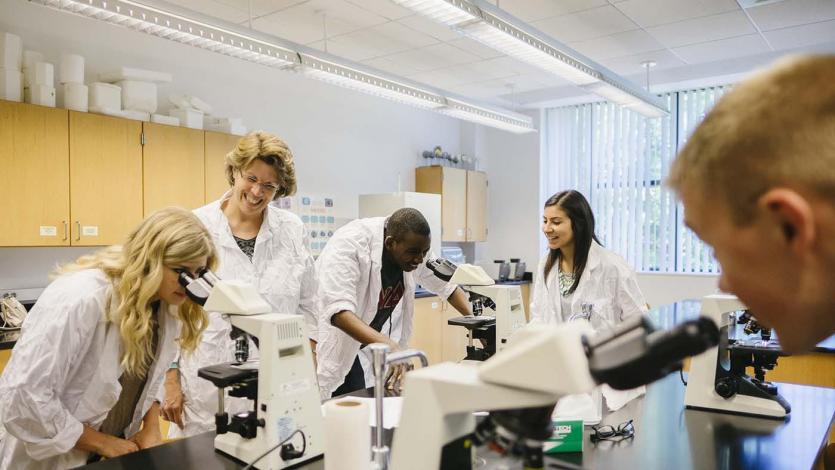
Augustana continues to build on its excellent programs and tradition of success in the sciences. A four-floor, 22,000-square-foot addition to the Hanson Hall of Science recently opened, and you can now major/minor in kinesiology.
Augustana has established a strong track record in preparing students for health care careers. In addition to a major in pre-medicine, Augustana has pre-professional programs in some of the fastest-growing and best-paying health care careers, according to the Best Health Care Jobs from U.S. News & World Report.
Check out the following programs and what alumni say about their experiences. See where Augustana can take you!
Pre-dentistry
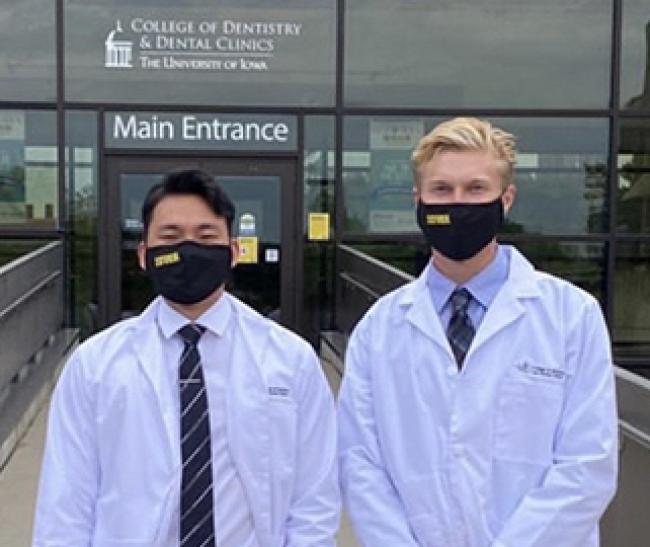
Dr. Jason Koontz received this photo from two former advisees, Chris Han '19 and Grant Bolle '19, taken in front of the University of Iowa College of Dentistry on the first day of their second year.
Advisor: Dr. Jason Koontz, biology professor
If you're looking for a strong foundation in the sciences to prepare you for the Dental Admission Test (DAT) and dental school, put Augustana on your list.
Augustana pre-dentistry graduates are accepted into dental school at a much higher rate than the national average, which is below 50%. In 2017 and 2019, 100% of Augustana's pre-dentistry students were accepted into dental school. Since 2016, the acceptance rate has been 88%.
About the program
- Most pre-dentistry students major in biology or biochemistry. Augustana's liberal arts focus creates space for you to explore the big issues facing our world today and become leaders in your profession and communities. Recommended electives include statistics or math, and advanced courses in art, English, history, philosophy, psychology, as well as social and political science. Choose a minor that reflects your intellectual curiosity; it doesn’t have to be science-related. Pre-dentistry student Carli Hogan '17 (see below) minored in art history.
- Strong advising relationships with experienced faculty advisors, not only within the pre-dentistry program but across campus, are a plus.
- You also can earn academic credit for internships locally or internationally. Augustana's internship program in Sydney, Australia, is popular with pre-dentistry students, who have been placed in dental offices in Sydney.
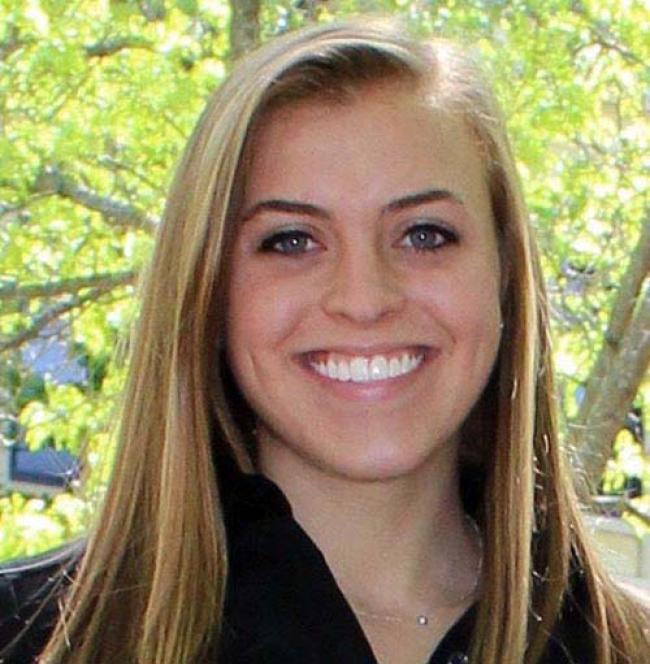
Hear from an alumna
Carli Hogan '17, Marquette University School of Dentistry
"I will forever be grateful I transferred to Augustana my sophomore year of undergrad. Augie was the perfect learning environment for me, and I felt fully prepared when I started dental school.
The science program is strong and the classes challenging, but the professors are available for their students every step of the way. They truly want to help you learn and succeed. They have high expectations of their students, but it allowed for a smooth transition from undergrad to my dental school courses.
The smaller class sizes at Augie also help to cultivate strong student/professor relationships organically, and the relationships I formed made getting letters of recommendation for my dental school application easy.
Also, Dr. Koontz, the pre-dental advisor, is knowledgeable and incredibly helpful with the whole application process. It can be a lot to navigate, but he was always available to answer any questions."
Pre-nursing
Advisor: Dr. Dara Wegman-Geedey, biology professor
While requirements vary among different schools, Augustana's pre-nursing program satisfies the general education and science prerequisites for nearly all nursing schools in the country.
Plus, few undergraduate students throughout the country have the opportunity to work in a human cadaver lab on their own campus. You will at Augustana.
As of 2020, Augustana has three dual-degree articulation agreements with Rock Island's Trinity College of Nursing & Health Sciences. Depending on your career interests, we offer:
- Bachelor of Arts and Bachelor of Science in Nursing (BA/BSN) dual-degree program
- Bachelor of Arts and Master of Science in Nursing (BA/MSN) dual-degree program
- BA-MSN Combined Acceptance Program for high school seniors
Most of our pre-nursing students major in biology or psychology, given the pre-requisites needed for nursing school, but many also double major or minor in public health; women, gender and sexuality studies; sociology; and ethics. Our aging studies experiential minor is becoming popular among pre-nursing students.
The job market for nurses is strong. The Bureau of Labor Statistics estimates that employment of registered nurses is expected to grow 12% through 2028. That’s more than double the average growth estimate for all occupations.
About the program
- Augustana's liberal arts focus will provide you with a more holistic approach to treating patients. This broad academic education gives you greater depth of understanding across cultures and disciplines, plus skills in critical thinking, communication and problem-solving.
- Understanding "the whole person" — not just being a technically trained nurse — is important to helping improve patients' health and well-being. Better patient outcomes can lead to greater responsibility and higher-paying positions.
- You'll be prepared for the rigors of nursing school. Besides study across the liberal arts, a BA from Augustana includes more science study than a typical four-year BSN, and includes much of the same coursework and laboratory experience taken by pre-meds and students preparing for other advanced health-care degrees.
Hear from an alumna
Emma Larson '18, RN, BSN, University of Iowa Hospitals & Clinics, Burn and Trauma Unit (the only burn unit in the state of Iowa, as well as a nationally recognized ICU for burn patients)
"My background coursework at Augustana prepared me for nursing school by helping me have a baseline knowledge of body systems, diseases and how we treat them via nursing interventions, diagnoses, etc.
As a double major in bio/public health, the variety of coursework helped me to have increased cultural awareness, tools to be an effective team member, and a deeper understanding of human disease and anatomy (thanks to my physiology/anatomy/microbiology classes).
My experiences at Augustana also helped tremendously once I was out working as a nurse day to day. Compared to colleagues that went right to nursing school, I feel I have an advantage when it comes to critical thinking, and how to look at the bigger picture."
Pre-occupational therapy
Biology majors: Dr. Lori Scott, professor
Psychology majors: Dr. Lisa Szafran, assistant professor
Occupational therapy jobs are projected to increase 16 percent through 2029, according to the U.S. Bureau of Statistics. Augustana's flexible pre-occupational therapy (OT) curriculum allows you to satisfy entrance requirements to most occupational therapy schools in the country.
Most of our pre-OT students major in psychology or neuroscience. Besides challenging coursework in biology, chemistry and physics, you can take advantage of the college’s liberal arts focus by taking classes in other areas in which you're interested — political science, ethics, art, etc.
All of our pre-OT students who applied to OT school in the last four years were accepted; up to 90% were accepted to their top choice schools. These included University of Illinois at Chicago, Rush University, Drake University and others.
About the program
- You have two options: (1) a four-year BA program at Augustana, or (2) a coordinated degree program in occupational therapy with Washington University in St. Louis. If you quality, you spend three years at Augustana followed by either two years (Master of Science in Occupational Therapy) or three years (Clinical Doctorate in Occupational Therapy) at Washington University.
- Augustana's CORE office will help you find opportunities to gain experience with OT professionals in local schools, hospitals and clinics. Some classes offer opportunities to work with populations likely to receive occupational therapy.
- Our internship program in Sydney, Australia, is popular with pre-OT students who want to travel abroad and gain valuable hands-on experience in the field.
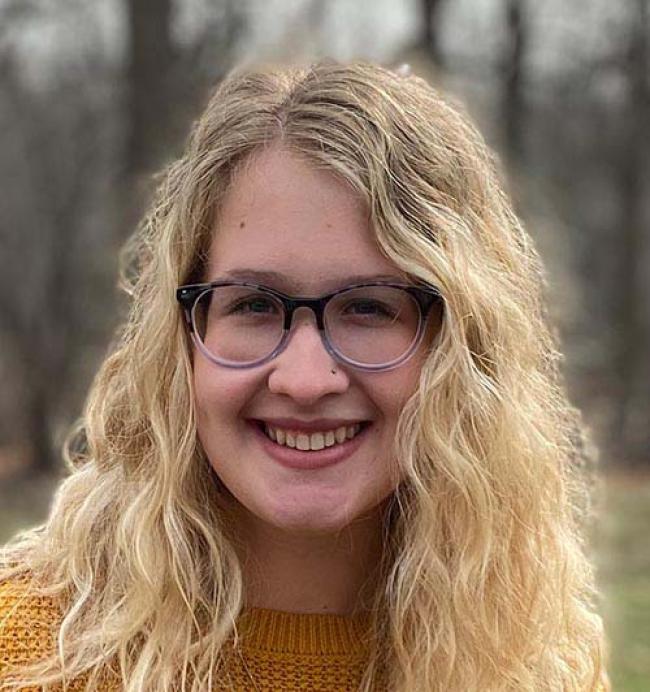
Hear from an alumna
Hannah Vercellotti '20, University of Illinois at Chicago
"Occupational therapists seek to help individuals fully engage in all of the daily activities that they find meaningful. This requires thoughtful consideration of a person’s unique abilities and limitations as well as their environments.
As a first-year occupational therapy student, I am learning how to observe these factors and see how they might be adapted to increase individuals’ participation in occupations. Without a doubt, I can say that the education and experiences that I gained at Augustana prepared me well for this task.
From studying abroad in Guatemala to being encouraged to take classes outside of my psychology major, I developed a well-rounded perspective of the many things that impact individuals' abilities to live meaningful and fulfilling lives."
Pre-optometry
Advisor: Dr. Dara Wegman-Geedey, biology professor
With only about 20 schools of optometry in the United States, it's competitive to get in. Augustana's pre-optometry program is designed to give you a strong foundation in the sciences as well as prepare you for the Optometry Admission Test (OAT) and optometry school.
We do a pretty good job.
From 2015-2019, 100% of our pre-optometry students were accepted to optometry school.
Developing an understanding of the field through clinical observations is important when applying to optometry school. Based within a strong liberal arts background that emphasizes experiential learning, all of Augustana’s pre-health sciences are focused on learning techniques and developing your skills through clinical experience.
About the program
- Our 3:4 program with highly ranked Illinois College of Optometry (Chicago) gives you the option of studying at Augustana for three years, then moving on to professional school a year early. About 85% of our pre-optometry students attend IOC; others have attended Indiana University School of Optometry (Bloomington), New England College of Optometry (Boston), Pacific University College of Optometry (Oregon), Pennsylvania College of Optometry at Salus University (Philadelphia), College of Optometry at University of Missouri (St. Louis), Chicago College of Optometry at Midwestern University (Downers Grove).
- The pre-optometry program is not a graduation major. Pre-optometry students may choose a major that fulfills optometry school requirements but most major in the biological sciences. Many of them, including 3:4s, double major or minor in another area, including psychology, religion, public health, Classics and sociology.
- A number of pre-optometry students have completed internships in Sydney, Australia, during our study abroad program.
- Our alumni are involved! They will work with you — by supervising internships, providing shadowing opportunities and sometimes even employing you.
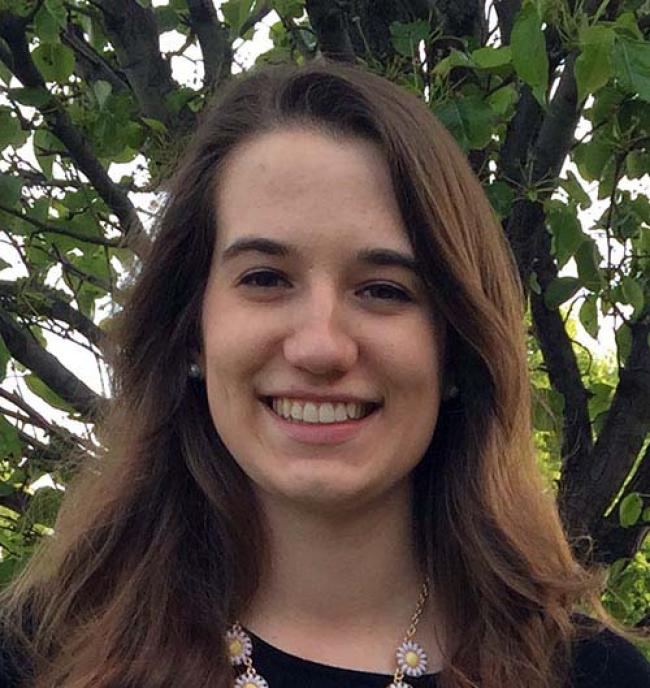
Hear from an alumna
Olivia Zolnik '18, Indiana University School of Optometry
"Augustana gave me the factual basis for succeeding in optometry school, but Augie prepared me best by making me a conceptual and critical thinker.
Being an optometrist is not only about knowing the scientific facts, but being able to solve complex problems, understand the big picture, and to be able to communicate that information to a diverse audience ranging from fellow colleagues to patients of all ages.
I think being in a smaller setting at Augie and taking advantage of that more individualized attention, along with taking a diverse set of classes, really make you think through problems from different perspectives.
Augustana also offers you opportunities to develop communication skills and grow as a person through all of the extracurriculars, study abroad and academic opportunities, and on-campus jobs.
Augustana prepared me very well, and it has played a large role in my success in optometry school and will serve me well for a lifetime!"
Pre-physical therapy
Advisors: Dr. Scott Gehler, associate professor, biology, and Dr. Lisa Szafran, assistant professor, psychology
Augustana's pre-physical therapy (PT) program prepares you for entrance requirements into physical therapy doctorate programs around the country.
We are one of only two undergraduate institutions with an articulation agreement with the highly ranked graduate PT program at Washington University in St. Louis. This gives qualified Augustana students a significant admissions advantage.
Our pre-PT students also continue their studies at Northwestern, University of Iowa, University of Illinois and other universities. In fact, our students’ five-year average acceptance rate to PT school is 90%, and most get into their top choice school.
About the program
- As a pre-PT student, you're most likely to major in biology, perhaps psychology. You may also want to consider Augustana’s new major/minor in kinesiology.
- Few undergraduate students throughout the country have the opportunity to work in a human cadaver lab on their own campus. You will at Augustana.
- PT schools look for applicants with solid experience in both practical application and clinical observation. The Quad Cities provides access to exceptional clinical opportunities — hospitals, private clinics, rehabilitation centers and geriatric care facilities — where you can participate in credit-bearing internships during the academic year.
- Our alumni are involved! They are available for advice or will work with you by supervising internships and providing shadowing opportunities.
Hear from alumni
Jessie Czarnecki '17, PT, DPT at Rise Physical Therapy, Fayetteville, Ark.
(Washington University St. Louis School of Medicine Program in Physical Therapy, DPT Class of 2020)
"Augustana prepared me well to take on this life path. There is a wide range of classes with a level of academic vigor that will prepare any student for graduate studies up ahead.
The resources and mentorship provided by the staff, especially Dr. Gehler, was integral for directing my academic decisions toward success when applying for PT school programs.
The opportunities for high-level, special-topic courses unique to Augustana, as well as the internship and travel abroad programs, brought me continuous learning experiences that allowed me to stand out among other applicants for PT school programs.
Augustana planted my roots; I wouldn't be where I am today in my career without this solid foundation."
Corey Lepoudre '18, DPTII student at Midwestern University, College of Health Sciences, Downers Grove, Ill.
"The professors and peers I met at Augustana are huge contributors to where I am today. They made up a large part of my support system throughout the application and interview process for PT school.
My professors wrote letters of rec for me, answered all of my questions, and helped me create a plan to better my chances of getting into a school.
I am in my second year in my DPT program, and I still attribute my success to Augie and the people I met there. I continue to keep in contact with my professors and cheer on my fellow Augie alumni in their physical therapy journeys.
Augustana has equipped me with not only the knowledge and willpower to be successful in a very fast-paced and difficult curriculum, but also the support system that has been there for me through it all."
Pre-physician assistant
Advisor: Dr. Tierney Brosius, associate professor of biology
If you're looking for a career in the health field, jobs for physician assistants (PAs) are projected to increase 31 percent through 2029, according to the U.S. Bureau of Labor Statistics. Augustana’s pre-PA advising program prepares students for the entrance requirements to any PA graduate program in the country.
And you’ll be ready! Augustana provides the rigor you need to be successful in PA school. Besides challenging coursework in biology, chemistry and physics, you can take advantage of the college’s liberal arts focus by taking classes in other areas in which you’re interested—political science, philosophy, ethics, etc.
This liberal arts approach helps you make connections between science, society, public health and being a practicing medical care professional. Be the leader in your graduate program—our students often are.
Your choice of a major is not critical for acceptance by a PA school, but the majority of our pre-PA students major in the biological sciences or psychology.
There’s more …
- Few undergraduate students throughout the country have the opportunity to work in a human cadaver lab on their own campus. You will at Augustana.
- The Quad Cities area has several hospitals, rehabilitation centers and nursing facilities where you can work during the school year, possibly for a credit-bearing internship, and build up contact hours at the same time. Augustana's faculty mentors work with the CORE career development office to help you find these clinical placements.
- You may want to work as a research assistant in a university lab around the country during the summer. One example is Augustana’s intensive internship program with the Texas Medical Center in Houston—one of the nation’s top cancer medical research centers.
- We offer a $2,000 Augie Choice grant to support a qualifying hands-on learning experience of your choice: internship, research or study abroad—to help you stand out when applying to PA schools (see below).
Hear from an alumna
Kailey Hoel '19, Dominican University in Chicago
"It was very helpful to major not only in biology, but also having another major (or a minor in a different field) is super helpful, Augustana’s liberal arts curriculum makes it very manageable for students to double major. I majored in biology and neuroscience, and I think this really helped me stand out from other PA students coming from bigger universities.
Augustana also allowed me to use my Augie Choice on a health-focused trip to central America. This experience gave me something related to current events and health care that I was able to talk about in every single interview and essay I did for PA school.
This trip also gave me a different perspective on health care in the global community compared to my counterparts. Augie Choice made this trip very affordable."
Pre-veterinary medicine
Advisors: Dr. Timothy Muir, biology associate professor, and Dr. Kimberly Murphy, biology chair and associate professor
Augustana is one of only three colleges with an early acceptance agreement with the University of Illinois College of Veterinary Medicine. If you're accepted into this program, you can enter veterinarian school at Illinois after only three years at Augustana.
The pre-veterinary medicine program is not a graduation major; most pre-veterinary students major in biology.
About the program
- While an undergrad, you can get experience during the school year at a variety of veterinary clinics in the Quad-City area, which will help you stand out when applying for admission to vet schools. These include Niabi Zoo, large animal clinics and small animal clinics.
- Augustana alumni established in the field are available to advise you if you’re interested. Some are local and will welcome you to shadow at their clinics.
- Few undergraduate students throughout the country have the opportunity to work in a human cadaver lab on their own campus. You will at Augustana.
- Not only knowledge but skills! "Several students have reported back that they appreciate how we taught and assessed skills for information literacy — finding scientific articles using a variety of databases, reading the articles and making sense of them and then communicating out in written and oral formats — which is so important for vet school," said Dr. Murphy.
Hear from an alumna
Phoebe Strell '18, dual D.V.M./Ph.D. program at the University of Minnesota
"Augie's small classes gave me the opportunity to develop meaningful faculty-student relationships. Augie also allowed me to design a curriculum that was tailored to my veterinary prerequisites and other majors, while providing rigorous material that put me at an advantage for my first semester of veterinary school. I went into veterinary school with an edge in my genetics/biochemistry and physiology/anatomy courses."
